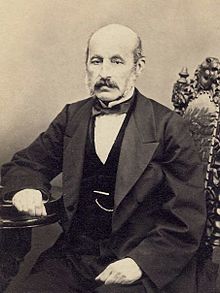Petrache Poenaru
This article has multiple issues. Please help improve it or discuss these issues on the talk page. (Learn how and when to remove these messages)
|
Petrache Poenaru | |
|---|---|
 Petrache Poenaru, in an 1860s photograph by Carol Szathmari | |
| Born | January 10, 1799 |
| Died | October 2, 1875 (aged 76) |
| Nationality | Wallachian, Romanian |
| Occupation(s) | inventor, mathematician, physicist, teacher, politician |
| Known for | inventing the fountain pen |
Petrache Poenaru (Romanian pronunciation: [peˈtrake po.eˈnaru]; 1799–1875) was a Romanian inventor of the Enlightenment era.
Poenaru, who had studied in Paris and Vienna and, later, completed his specialized studies in England, was a mathematician, physicist, engineer, inventor, teacher and organizer of the educational system, as well as a politician, agronomist, and zootechnologist, founder of the Philharmonic Society, the Botanical Gardens and the National Museum of Antiquities in Bucharest.
While a student in Paris, Petrache Poenaru invented the world's first fountain pen, an invention for which the French Government issued a patent on 25 May 1827.[1]
Biography
He was born in 1799 in Băneşti, Vâlcea County. His uncle, Iordache Otetelişanu, was one of the promoters of an institutionalized educational system, in a time when a great part of the population was illiterate. Poenaru attended the secondary school Obedeanu in Craiova and worked as a copyist at the office of the bishop of Râmnicu Vâlcea. Later on, between 1820 and 1821, he taught Greek language at the Metropolitan School in Bucharest.
In 1821, the Revolution led by Tudor Vladimirescu began. At that time, Wallachia was under Turkish domination and was ruled by the Phanariots (Greeks originating from Constantinople and very loyal to the Sultan), who burdened the country with numerous taxes and an expensive and corrupt court. Tudor Vladimirescu gathered an army of Oltenian soldiers called panduri and moved towards Bucharest to overthrow them. He was joined by many and, among them, was the young Petrache Poenaru. During his first skirmish, he proved he didn’t have any fighting abilities and his comrades took him in front of the revolution’s leader, for punishment. But Vladimirescu was impressed by the young man’s educated spirit and sharp mind and made him his personal assistant. From this position, he elaborated the army’s manifesto, now considered one of the first Romanian newspapers.[citation needed]
Poenaru was lucky enough not to be around Tudor Vladimirescu when the leader was lured in a trap and assassinated, as he was sent in a diplomatic mission to advocate the Romanian cause to the representatives of the great powers, Russia, Austria or England. After news of Vladimirescu’s death spread, he took refuge in Sibiu.
When the political situation improved, he was able to earn a scholarship to study in Vienna, in 1822. There, he learnt about measuring tools and micrometers, unknown to the underdeveloped Romanian engineering field and discovered a great appetite for technical sciences, while also fervently studying Greek, Latin, French, Italian and English. In a letter sent to his family, he confessed that he thought the sweetest pleasure a man can experience is learning.
In 1824, the Wallachian ruler Grigore Ghica granted him another scholarship, which compelled Poenaru to return to the country after the studies ended and share his acquired knowledge as a teacher. In 1826 he went to France and attended the École Polytechnique in Paris, where he studied geodesy and surveying. He was so busy taking notes and copying courses, that he invented a writing tool which allowed him to save time. This was the fountain pen. On 25 May 1827, the Manufacture Department of the French Ministry of the Interior registered Poenaru’s invention with the code number 3208 and the description ”plume portable sans fin, qui s’alimente elle-meme avec de l’ancre" ("never-ending portable pen, which recharges itself with ink"). This invention prevented paper scratches, ink leaks and was made of replaceable parts.
